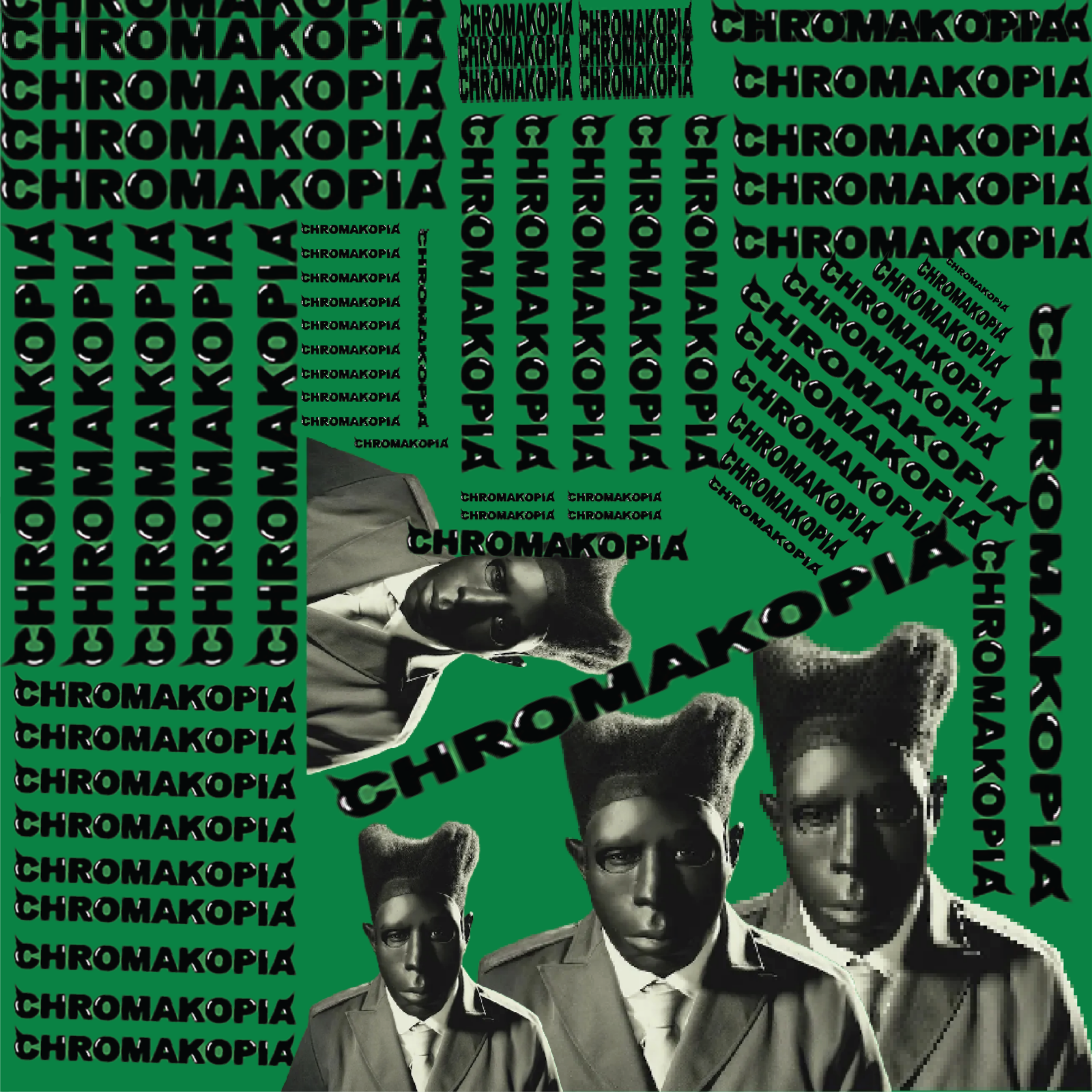
Joe Forrestdavis is a content writer and disc jockey for KCPR. The opinions expressed in this article do not necessarily reflect those of Mustang Media Group.
“CHROMAKOPIA” marks not just the seventh studio album by Tyler, The Creator, but a new visionary era.
After the adventures of Flower Boy, IGOR and Tyler Baudelaire in previous albums, listeners are witnessing the dawn of St. Chroma, a horned-haircut, masked alter ego.
The first track titled after Tyler’s new alter ego features his mom, Bonita Smith, advising Tyler. Smith is featured throughout the album, counseling her son with a series of voice messages meant for an older Tyler. He reflects on the advice he received as a kid at 33, realizing how much it applies to the intricacies of adult life.
After the opening track sets the stage, the album draws you in with a hardcore hip-hop song titled, “Rah Tah Tah.” This song feels like a nod to early-day Tyler fans who remained dedicated since the “Goblin” and “Wolf” albums, with the two LPs featuring Tyler’s angry and confident rapping.
The storytelling and lyrics of “CHROMAKOPIA” are arguably the strongest aspects of the album, as the narrative explores themes of fame, age, identity and the rapper’s own “midlife crisis.”
A standout song is the slow R&B track “Like Him,” which showcases Tyler addressing his mother’s belief that he resembles his father, from his shoulders to his posture and even his expressions. Tyler’s father deserted his family at a young age, never having the chance to meet and reconnect with him.
Fans understand that this is a personal song from Tyler as he is being told that he looks like the extension of a man he has openly criticized throughout his whole discography. In an interview with Larry King, King asked Tyler if he was mad at his father for leaving, to which Tyler responded, “No, dude, I’m stoked. I think if I had a dad, I would’ve gone the normal college route like a lot of other people.”
Listeners can interpret the mask from the “CHROMAKOPIA” cover as a representation of the dull facades people adopt to fit societal norms. The album tells us that our authentic identities — bad or good — are hidden behind these coverings, which Tyler dives into on the track “Take Your Mask Off.”
He raps about the different lives of common people to illustrate how masks are developed. Tyler brings listeners the internal struggles of a priest hiding from the fact that he is gay due to religious shame, to a mother of three with a breadwinning husband and how her personal desire for independence does not align with her outside life.
As Tyler wraps up the song with another example, listeners can catch that Tyler is referring to himself from a third-person view, rapping about insecurity — which is not a typical topic for Tyler. He acknowledges his “tough guy” front, revealing that he truthfully craves recognition and runs away from things he is scared of such as having a kid and possibly failing.
“Judge Judy” is a smooth, rhythmic song about an encounter Tyler had with a past lover, featuring storylines similar to the late Prince’s song “Darling Nikki” that includes a twist at the end.
Tyler dives more into his love life with the upbeat track “Darling, I” which details his experiences with falling in love, yet not being able to settle down or find satisfaction. This theme continues in “Hey Jane” with a downtempo that is uniquely paired with Tyler’s rap performance. The track dives into a complicated relationship, the decision on whether to have a child and looking inside a partner’s mind.
The album has features from artists such as Daniel Caesar, Teezo Touchdown, ScHoolboy Q, Santigold, Lola Young, LaToiya Williams and Doechii.
The build-up rap track “Sticky” features GloRilla, Sexyy Red and Lil Wayne. While it is a fine song on its own, the placement of the song on the tracklist is a massive downside as it does not fit the direction of “CHROMAKOPIA.”
The album as a whole has these grand ideas and important themes of storytelling but constantly jumps in a disorganized manner when listening to it thoroughly. To go from the groovy “Judge Judy” about celebrating yourself before time runs out, to the chaotic “Sticky,” toasting to sexual freedom, to slowing down with “Take Your Mask Off” asks a lot from listeners within just three tracks.
However, “I Killed You” is an intriguing song with many layers to it as Tyler talks about his heritage, curly hair and how his Black features are not viewed as a normal beauty standard, bringing down the self-esteem of the Black community.
It is also worth noting that in all of Tyler’s past albums — besides IGOR — he is wearing something to conceal his hair. Listeners can look to St. Chroma as a new persona, allowing Black hair to be a prominent feature.
Tyler has delivered another album that has a lot of thought and detail put into it from top to bottom.
It might seem redundant to say, but with more listens of “CHROMAKOPIA,” listeners can appreciate and understand more of the new LP by catching something they did not hear upon the first, second or even third listen.

